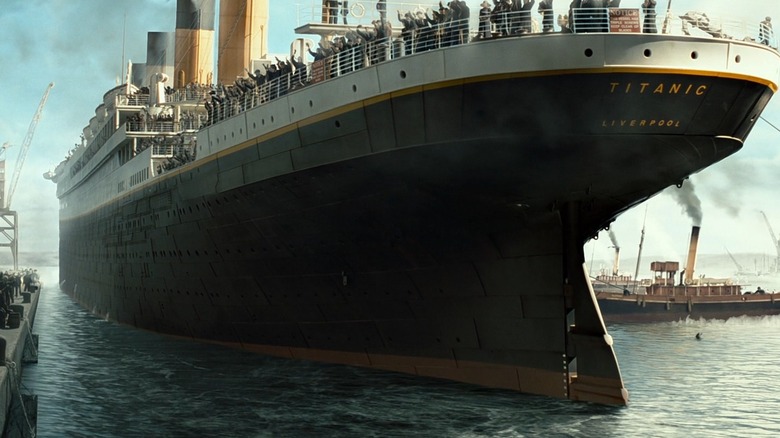James Cameron Gave Up His Backend Box Office Profit Potential To Boost Titanic's Budget
(To celebrate "Titanic" and its impending 25th-anniversary re-release, we've put together a week of explorations, inquires, and deep dives into James Cameron's box office-smashing disaster epic.)
Until just last month, when it was dethroned by "Top Gun: Maverick," "Titanic" was the highest-grossing film in Paramount Pictures' history. The film had a budget of $200 million; at the time of this writing, the worldwide gross is over $2 billion, according to Box Office Mojo. That's a pretty good take for the studio, but director James Cameron didn't make that much on it. While that sounds astounding, there is a pretty good reason for it.
The story of the aristocratic Rose (Kate Winslet), whose father has died and left her and her mother (Frances Fisher) penniless, the poor artist Jack (Leonardo DiCaprio), their love story, and the sinking of the famous ocean liner has captivated fans for a quarter of a century now. The story of how it all came together is almost as fascinating as the tale of the Titanic itself. The inflated budget, Cameron's decision on how to deal with that, and why he did it were spoken about early on. In fact, right before the film hit theaters in 1997, the writer-director sat down with Charlie Rose to chat about the film and whether he would have done it if he had known about the budget issues beforehand.
' ... it's not something I probably would have gone into'
In the interview, Rose asks Cameron if he really gave up his points (a percentage of a motion picture's income) and salary for the film, which had a reported budget of $100 million that had doubled by the end of the film. Cameron says:
"Yes, well, that's true. It evolved [...] probably if I had been told in advance you're going to work for three years for nothing, I would have said, 'thanks very much.' [laughs] As much as I love this film and as much as I am passionate about it, I mean that it's not something I probably would have gone into."
Most filmmakers wouldn't actively choose to give up a salary for three years; however, Cameron's passion for this film and decision to give up his take clearly paid off. Not only did "Titanic" make an incredible amount of money, but it was nominated for 14 Academy Awards and won a whopping 11, including Best Picture and Best Director.
'I don't want you to think we lied to you'
This isn't the only time Cameron spoke about giving up his salary for "Titanic." It was a huge news story at the time, and the director joined Howard Stern on his Sirius XM channel in 1997 to talk about it. He told Stern that the budget was actually initially $120 million and that he really didn't think it would go above that. Watching the final part of the film again, when the ship starts to sink, makes you wonder how that's possible, but either way, it's still incredibly powerful.
Stern asked Cameron if he'd been lying to the studio about the production's monetary requirements. Cameron replied, "No, in fact, that's why I wound up giving them back all my money because I said, 'Guys, I don't want you to think we lied to you just so we can get you to make this movie.'" He confirmed that he gave it back halfway through the shoot and said again that this was really three solid years for him. He'd been working on "Titanic" since he finished "True Lies."
To be fair, Cameron did retain something, as he said he still holds authorship of the film. But he didn't get a percentage of the gross take. He did joke that he's fine and "not going to be out on the street selling pens." Yeah, I think it's safe to say he's going to be okay in the financial department.
"Titanic" will be re-released in theaters on February 10, 2023.


